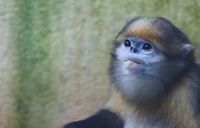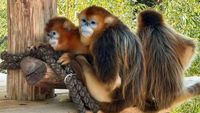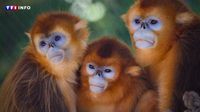On May 7, 2025, three golden monkeys from China made their public debut at the ZooPark of Beauval in Saint-Aignan, France, marking the first time this endangered species has traveled outside Asia. The trio, consisting of one male and two females, arrived in early April from the Shanghai Wild Animal Park, where they were born. Accompanied by a Chinese caretaker, they underwent a month-long quarantine to ensure their health before being introduced to the public.
The arrival of these golden monkeys is part of a ten-year partnership between the ZooPark of Beauval and the China Wildlife Conservation Association, aimed at enhancing cooperation in wildlife protection and conservation. During a welcoming ceremony, the zoo's director, Rodolphe Delord, revealed the names of the new residents: Jindou (Golden Seed), Jinbao (Golden Treasure), and Jinhua (Golden Flower). These names were chosen through an online naming competition that garnered significant public interest.
"Like the pandas, the arrival of these primates strengthens the ties between France and China in the field of animal conservation," Delord stated during the event. The zoo previously welcomed giant pandas Huanhuan and Yuanzai in 2012, which initiated a successful Sino-French cooperation program focused on panda breeding. With the addition of the golden monkeys, the ZooPark of Beauval has become the first location outside Asia to host this rare and endangered species.
Golden monkeys, known scientifically as Rhinopithecus roxellana, are native to the mountainous forests of central and southwest China. They are recognized for their striking golden-orange fur and distinctive upturned noses. These primates are considered a national treasure in China and are under top-level state protection due to their endangered status. The species is listed as 'Endangered' by the International Union for Conservation of Nature (IUCN), primarily due to habitat loss caused by agriculture, logging, and tourism.
At the zoo, the golden monkeys are housed near the giant pandas, which are also a major attraction. Their enclosures are designed to mimic their natural habitat, featuring various plants that provide both nutrition and stimulation. The care team at Beauval, led by zookeeper Cyrielle Lambert, has implemented a diet that includes willow, apple, pear, and mulberry leaves, ensuring the monkeys have a varied and healthy menu.
The monkeys were introduced to each other on April 15, 2025, and the initial interactions were promising. Lambert noted, "The females immediately groomed the male, which is a positive sign of social bonding among primates. Since mid-April, all three golden monkeys have been in the same space, and everything has been going well." This social harmony is crucial as the zoo hopes for the monkeys to breed during their ten-year stay.
Delord expressed optimism about the future, stating, "We hope to see the birth of babies soon, which can then be returned to China for reintroduction into their natural environment." The goal is not only to enhance the zoo's conservation efforts but also to contribute to the global population of golden monkeys, which have been declining in the wild.
The significance of this event extends beyond the zoo's walls. The collaboration between France and China in wildlife conservation is a diplomatic gesture that underscores the importance of international cooperation in addressing environmental challenges. This partnership is seen as a bridge between the two nations, fostering goodwill and mutual respect through shared goals in conservation.
Visitors to the ZooPark of Beauval have expressed excitement and emotional responses upon seeing the golden monkeys for the first time. Many were eager to witness this unique opportunity, as it is the first time these animals have been publicly displayed outside of their native continent. "Oh, they are beautiful!" exclaimed one visitor, reflecting the awe many felt during the unveiling.
As the golden monkeys settle into their new home, the zoo staff are committed to monitoring their health and behavior closely. The presence of these monkeys not only enriches the zoo's biodiversity but also serves as an educational tool for visitors, raising awareness about endangered species and the importance of conservation efforts.
In conclusion, the arrival of Jindou, Jinbao, and Jinhua at the ZooPark of Beauval represents a significant milestone in international wildlife conservation. This historic event highlights the potential for collaborative efforts to protect endangered species and foster a deeper understanding of the challenges they face. As the zoo embarks on this new chapter, the hope is that these golden monkeys will thrive and contribute to the preservation of their species for generations to come.






